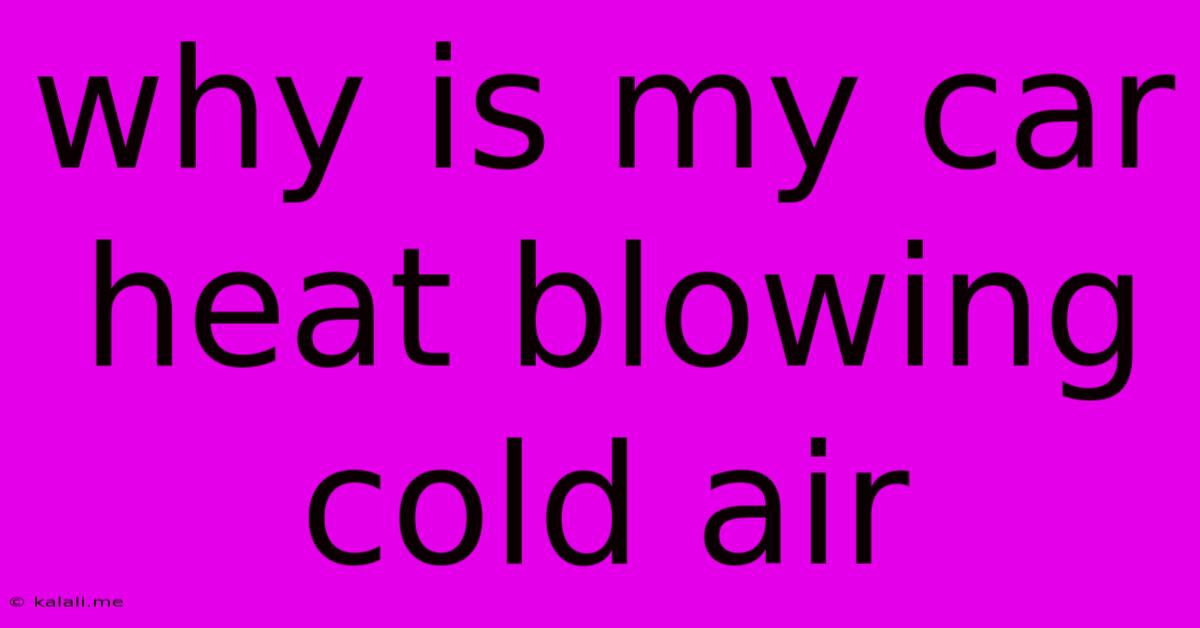Why Is My Car Heat Blowing Cold Air
Kalali
May 21, 2025 · 4 min read

Table of Contents
Why Is My Car Heat Blowing Cold Air? A Troubleshooting Guide
Is your car's heater suddenly blowing cold air, leaving you shivering on those chilly mornings? Don't worry, this is a common problem with several potential causes. This guide will walk you through troubleshooting the issue, helping you identify the problem and potentially fix it yourself or know what to tell your mechanic. We'll cover everything from simple checks to more complex issues, so buckle up and let's get started!
Understanding Your Car's Heating System:
Before diving into troubleshooting, it's helpful to understand the basics. Your car's heating system utilizes your engine's coolant to generate warmth. Coolant circulates through the engine, absorbing heat, and then flows through a heater core located within the dashboard. A fan blows air over this heater core, which then distributes warm air throughout your vehicle's cabin. Any disruption in this process can lead to cold air blowing from your vents.
Common Causes of Cold Car Heat:
Several factors can cause your car's heater to malfunction. Let's examine the most frequent culprits:
1. Low Coolant Levels:
This is the most straightforward reason. Insufficient coolant means less heat transfer to the heater core, resulting in cold air. Check your coolant reservoir (usually a translucent plastic tank) and top it off with the correct coolant/water mix if necessary. Refer to your owner's manual for the recommended mixture ratio. Low coolant levels can also indicate a leak, so inspect hoses, the radiator, and the water pump for any signs of damage.
2. Thermostat Issues:
The thermostat regulates coolant flow. A faulty thermostat that remains closed will prevent coolant from reaching the heater core. A stuck-open thermostat, conversely, can cause overheating but might still allow some limited heat. Replacing a malfunctioning thermostat is often a relatively simple DIY repair.
3. Faulty Heater Core:
The heater core itself can become clogged, corroded, or leak. If the core is leaking, you might even notice a sweet smell (antifreeze) in the cabin. A plugged heater core prevents coolant from circulating properly, reducing or eliminating heat. Replacing the heater core is a more complex repair usually requiring professional assistance.
4. Blown Heater Blower Motor Fuse or Relay:
The blower motor is responsible for pushing air through the vents. If the fuse or relay associated with the blower motor has blown, the fan won't operate, resulting in no airflow, regardless of the coolant temperature. Check your owner's manual to locate the correct fuse and relay for your heater blower motor.
5. Malfunctioning Blower Motor Resistor:
The blower motor resistor controls the fan speed. A faulty resistor might prevent the fan from operating at all or limit it to only high speed. This can cause inconsistent or weak airflow.
6. Bleeding the Cooling System:
Air pockets in the cooling system can interfere with proper coolant circulation. Air bubbles can prevent the heater core from receiving sufficient coolant, leading to cold air. Bleeding the system, which involves removing trapped air, might solve the problem. Consult your owner's manual for instructions specific to your vehicle.
Troubleshooting Steps:
- Check Coolant Levels: This is the first step. Low coolant is the easiest and often the most common cause.
- Inspect Hoses and Radiator: Look for leaks or cracks in hoses and the radiator.
- Check Thermostat: Consider replacing the thermostat if you suspect it's malfunctioning.
- Examine the Blower Motor Fuse and Relay: Check these components using a multimeter or by visual inspection.
- Check the Blower Motor Resistor: This often requires more detailed investigation.
- Bleed the Cooling System: If all else fails, bleeding the cooling system might resolve the issue.
When to Seek Professional Help:
If you've checked these items and still have cold air blowing from your heater, it's time to consult a qualified mechanic. Issues like a leaking or clogged heater core often require specialized tools and expertise for repair or replacement.
This guide provides a starting point for diagnosing the problem of cold car heat. Remember to always consult your owner's manual for specific information and safety precautions related to your vehicle's heating system. Stay warm!
Latest Posts
Latest Posts
-
Vlc Player How To Rotate Video
May 22, 2025
-
How To Say My Name Is In Japanese
May 22, 2025
-
How Long After Tiling Can You Grout
May 22, 2025
-
How Long Does Spag Bol Last In Fridge
May 22, 2025
-
Is There A Post Office At London Heathrow Airport
May 22, 2025
Related Post
Thank you for visiting our website which covers about Why Is My Car Heat Blowing Cold Air . We hope the information provided has been useful to you. Feel free to contact us if you have any questions or need further assistance. See you next time and don't miss to bookmark.